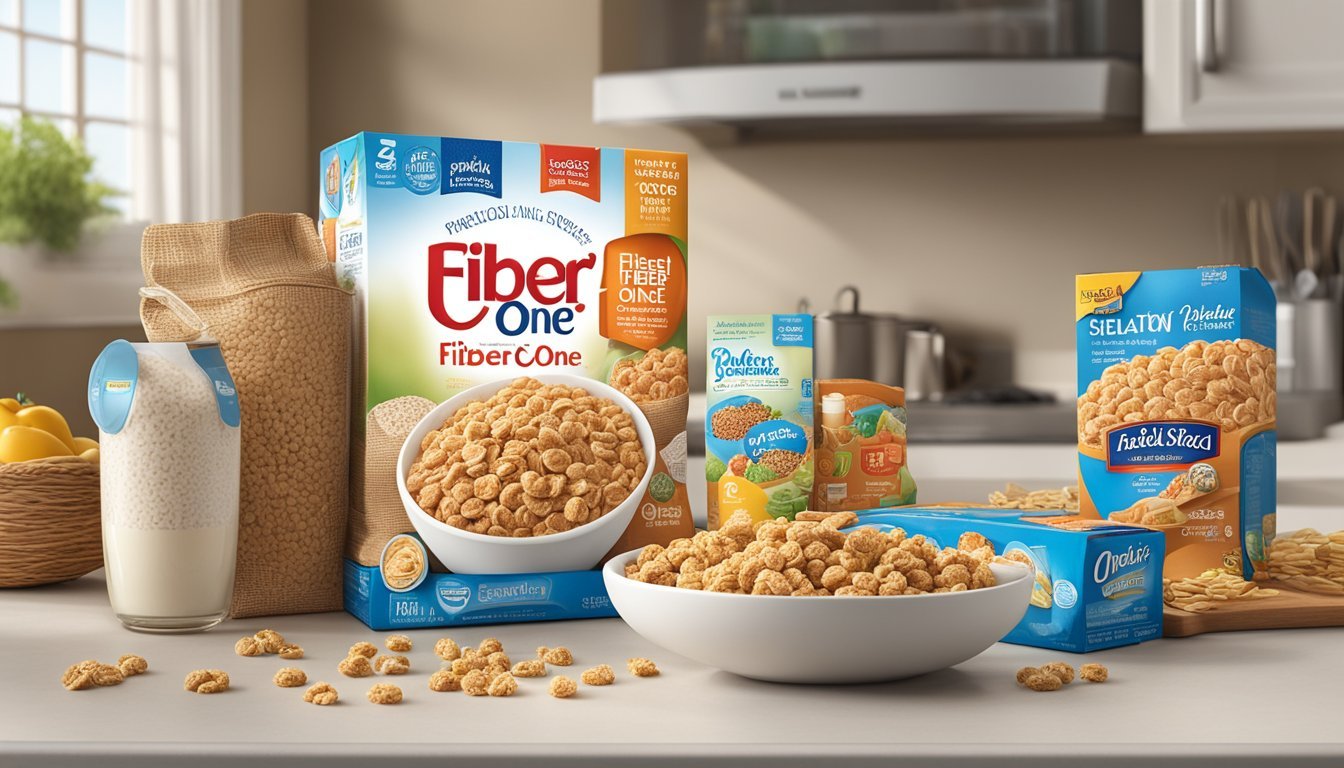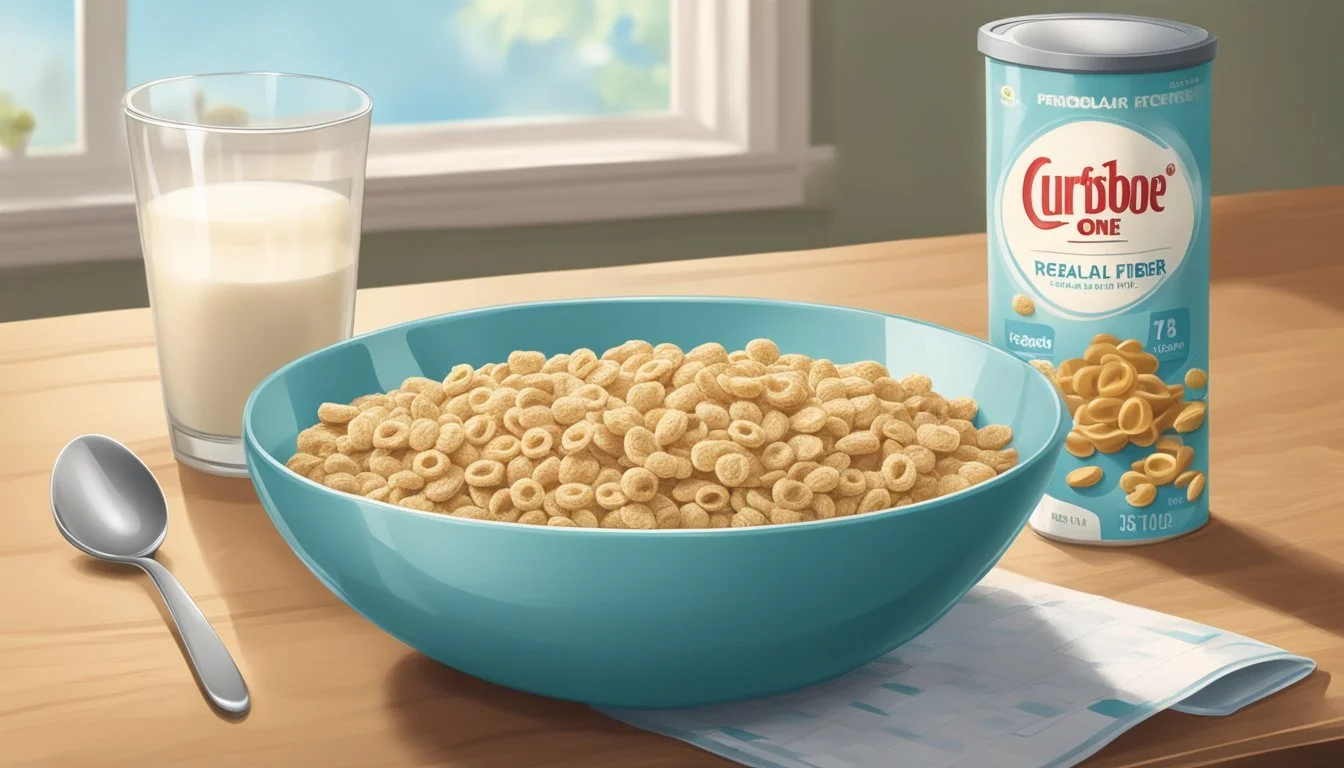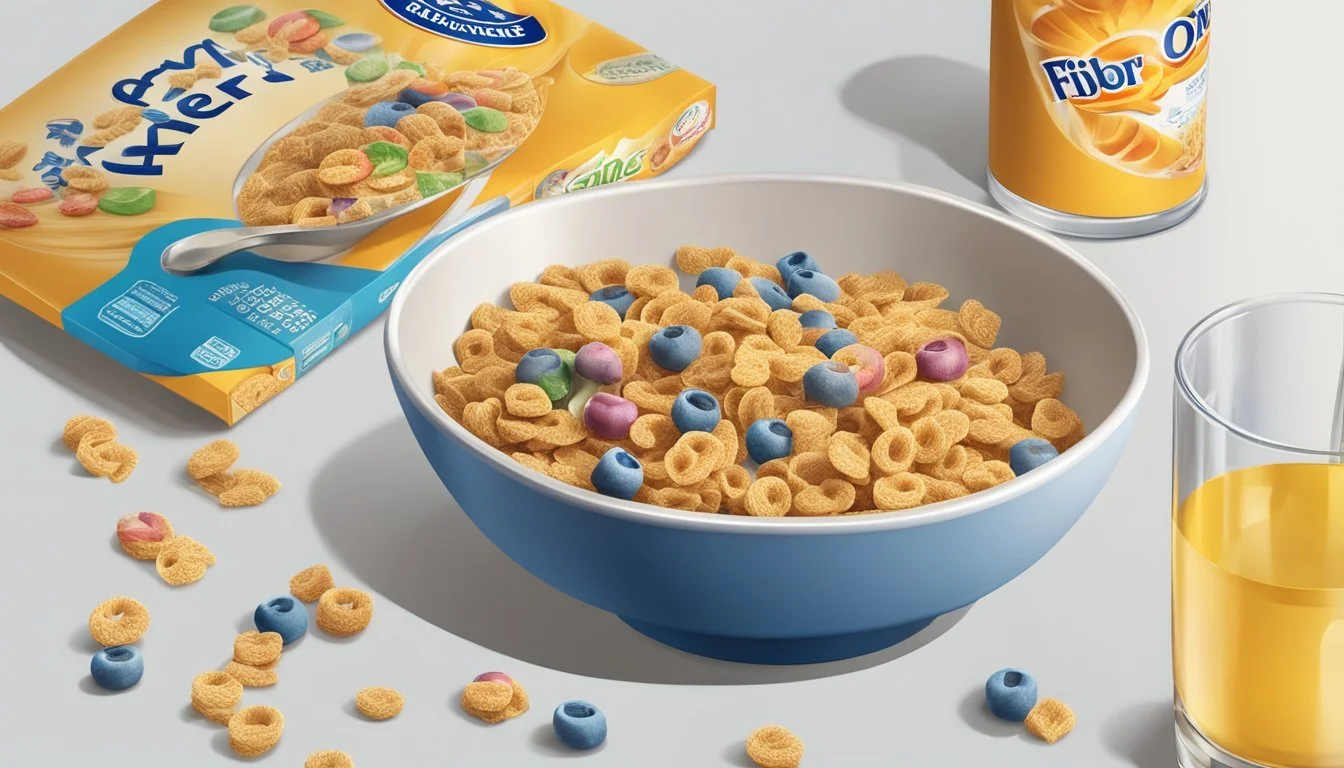How Long Does Fiber One Last?
Understanding Shelf Life and Quality Preservation
Understanding the shelf life of packaged food items is critical for consumers who look for both convenience and nutrition. Fiber One bars, a popular choice for those seeking to increase their dietary fiber intake, offer a practical solution for on-the-go snacking while contributing to daily nutrition. Typically, these bars have a shelf life ranging from 6 to 12 months from the production date, highlighting the importance of noting the expiration date provided on the package.
Dietary fiber is essential for maintaining overall health, as it supports digestive health and can contribute to preventing constipation. However, as with any food product, the consumption of Fiber One bars past their expiration date is not recommended, as it could reduce their quality and nutritional value. Consumers should be cautious and ensure they are consuming food products within recommended time frames to gain the health benefits associated with adequate fiber intake.
In the broader context of nutrition, dietary fiber plays a pivotal role. Found mainly in fruits, vegetables, whole grains, and legumes, fiber contributes significantly to a healthy diet. Beyond aiding digestion, incorporating sufficient amounts of fiber from varied sources is linked to multiple health benefits, potentially including lowered cholesterol levels and better blood sugar management. Thus, while Fiber One bars can be part of a fiber-rich diet, they should ideally be consumed in conjunction with a diverse array of fiber-containing foods to meet daily nutritional needs effectively.
Understanding Fiber
Fiber is an essential nutrient found in plants that is key to a healthy diet. It is categorized into two types: soluble and insoluble. Each type plays a unique role in health.
Soluble fiber dissolves in water and can help lower blood glucose and cholesterol levels. It is found in foods like oats, apples, and beans. Insoluble fiber, on the other hand, does not dissolve in water and is beneficial for bowel health. It adds bulk to stools and promotes regular bowel movements. Whole grains and many vegetables are good sources of insoluble fiber.
Incorporating a mix of both types of fiber is advantageous. High-fiber foods generally contain a proportion of both soluble and insoluble fiber. Diets rich in these foods, such as fruits, legumes, whole grains, and vegetables, can assist in preventing constipation and may offer relief to individuals with irritable bowel syndrome (IBS).
However, increasing fiber intake should be done gradually to minimize potential side effects such as bloating. As fiber intake increases, so should water consumption to help fiber move through the digestive system.
Benefits of Soluble Fiber:
Regulates blood sugar
Lowers cholesterol
Benefits of Insoluble Fiber:
Aids in digestion
Prevents constipation
Finally, while fiber is not digested by the body, it is a crucial element for maintaining bowel health and supporting the body's digestive system.
Sources of Fiber
Fiber is a fundamental nutrient for digestive health and can be found in an array of whole foods and supplements. It aids in digestion, helps maintain a healthy weight, and can reduce the risk of various diseases.
Natural Sources
Natural sources of fiber come from plants. Fruits and vegetables are prime examples, with berries, apples, pears, leafy greens, and root vegetables offering significant amounts of fiber. Legumes such as beans, lentils, and peas are fiber-dense foods that support digestive health. Grains, especially whole grains like quinoa, barley, and oats, provide both soluble and insoluble fiber. Nuts and seeds, including almonds, chia seeds, and flaxseeds, not only contain fiber but also healthy fats and proteins.
Fruits: berries, apples, pears
Vegetables: leafy greens, root vegetables
Legumes: beans, lentils, peas
Grains: quinoa, barley, oats
Nuts/Seeds: almonds, chia seeds, flaxseeds
Fiber Supplements
Fiber supplements serve as an alternative or an addition to natural sources, beneficial for those who struggle to consume enough fiber through diet alone. These supplements can come in various forms, including powders, capsules, and chewables. They often contain isolated types of fiber such as inulin, methylcellulose, or psyllium husk. When incorporating fiber supplements into one's diet, it is crucial to increase fluid intake to aid in the fiber's positive effects on the digestive system.
Powders/Capsules: inulin, methylcellulose, psyllium husk
Increase Fluid Intake: Necessary when taking fiber supplements
Benefits of Fiber
Dietary fiber is a vital component of a healthy diet, with extensive benefits ranging from digestive system regulation to cholesterol management. It aids in maintaining overall bodily functions at optimal levels.
Digestive Health
Dietary fiber promotes healthy bowel movements by increasing stool bulk, which facilitates smooth passage through the digestive system and helps prevent constipation. Soluble fiber, which is found in oat bran, nuts, seeds, and legumes, can also help normalize bowel movements and may protect against certain gastrointestinal conditions.
Cholesterol and Heart Health
Fiber, particularly the soluble type, is beneficial for cholesterol and heart health. It assists in lowering bad LDL cholesterol levels, which can contribute to a reduced risk of heart disease. Foods like whole grains, beans, and some fruits are rich sources of soluble fiber that support cardiovascular health.
Blood Sugar Regulation
In the arena of blood sugar regulation, fiber plays a crucial role. It can slow the absorption of sugar, helping to maintain more stable blood sugar levels. This is especially important for individuals with diabetes or those at risk of developing the condition.
Weight Management
For weight management, fiber has the remarkable ability to create a feeling of fullness without adding calories. By doing so, it aids in weight loss endeavors and helps prevent overeating. High-fiber foods require more chewing time, giving the body ample opportunity to register fullness, thereby reducing overall intake.
Daily Fiber Intake
An individual's fiber needs vary based on gender and age. Adequate fiber intake is crucial for maintaining digestive health and reducing the risk of chronic diseases.
Recommendations for Men
For men under 50, the Dietary Guidelines for Americans suggest a daily fiber intake of 38 grams. As men age, their dietary fiber needs decrease slightly due to changes in metabolic rate and digestive health. Therefore, it's recommended that men over 50 consume 30 grams of fiber daily.
Recommendations for Women
Similarly, the recommended daily fiber intake for women under 50 is 25 grams. Due to reduced energy requirements and digestive efficiency, women over 50 should aim for a daily fiber intake of 21 grams. This intake supports a woman's digestive system and overall health as they age.
Incorporating Fiber into the Diet
Incorporating fiber into one's diet is straightforward with careful meal planning and attention to hydration considerations. Consuming a variety of fiber-rich foods like whole grains, fruits, and vegetables ensures a balanced intake of both soluble and insoluble fiber.
Meal Planning
To effectively integrate fiber into a diet, individuals should plan their meals around foods that are naturally high in fiber. A table listing common fiber-rich foods simplifies the process:
Fiber Sources Examples Whole Grains Brown rice, quinoa, whole wheat Fruits Apples, berries, oranges Vegetables Broccoli, carrots, leafy greens
One can start by incorporating a serving of whole grains in each major meal, such as oatmeal for breakfast or brown rice with dinner. Adding a salad packed with a variety of colorful vegetables can significantly increase daily fiber intake. Snacks might include raw fruits or vegetable sticks to boost fiber between meals.
Hydration Considerations
As fiber intake increases, it is critical to consume adequate amounts of water for proper hydration. Fiber works best when it absorbs water, making the digestive process smoother and more efficient.
Aim for at least 8-10 glasses of water per day.
Drink water before and after high-fiber meals to assist with digestion.
Be mindful of the body's hydration cues such as thirst and the color of urine.
By pairing increased fiber intake with sufficient hydration, individuals can maintain a well-functioning digestive system and avoid potential issues such as bloating or constipation.
Potential Side Effects of Fiber
Fiber is an essential part of a healthy diet, but an abrupt increase in fiber intake can lead to some uncomfortable side effects.
Gas and Discomfort
When an individual consumes more fiber than their body is accustomed to, it may result in gas. This is because fiber is fermented by bacteria in the large intestine, which can produce excess gas as a byproduct. Discomfort often accompanies this gas, which may manifest as feelings of fullness or pressure in the abdominal area, commonly referred to as bloating.
Adjusting Fiber Intake
To minimize side effects, a person should adjust their fiber intake slowly. This gradual approach allows the digestive system to adapt to the changes. If one experiences an overabundance of gas or discomfort from high fiber consumption, it's advisable to reduce the fiber intake slightly and then increase it gradually. Drinking plenty of water can also aid the process as it helps fiber pass through the digestive system more easily.
The Role of Fiber in Overall Health
Dietary fiber plays a crucial role in the maintenance of overall health. It functions effectively in various systems within the body, with particular benefits for digestion and cardiovascular wellness.
Firstly, fiber significantly aids digestion. It increases the weight and size of the stool, which makes it easier to pass, thereby decreasing the risk of constipation. Conversely, for loose, watery stools, fiber helps to solidify them by absorbing water and adding bulk.
Bowel Movements: Normalizes bowel movements by enhancing stool bulk and reducing constipation risks.
Colon Health: Contributes to the prevention of colorectal cancer by promoting regular bowel clearance.
In terms of blood sugar regulation, fiber helps to moderate the body's processing of sugars, which assists in maintaining stable blood sugar levels. This is particularly important for individuals managing diabetes or seeking to prevent its onset.
Blood Sugar Levels: Helps to keep hunger and blood sugar in check, reducing fluctuations that can lead to energy spikes and dips.
Fiber also has a relationship with heart health. It's been shown to lower bad cholesterol levels, potentially reducing the risk of cardiovascular disease. This function aligns with its ability to improve metabolism and insulin sensitivity, which are beneficial for metabolic health.
Cardiovascular Disease: May reduce the risk by contributing to lower cholesterol levels and improved insulin sensitivity.
In conclusion, adequate intake of dietary fiber is paramount for maintaining healthy bowel movements, protecting colon health, stabilizing blood sugar levels, and potentially reducing the risk of cardiovascular disease. Adults typically require 25 to 35 grams of fiber per day, but many fall short of this, highlighting the need for a conscientious approach to dietary intake.
Fiber's Impact on Disease Prevention
Dietary fiber is a crucial component in disease prevention, particularly in reducing the risk of certain types of cancer and aiding in the management of diabetes. It contributes to maintaining balanced cholesterol levels, which can help in preventing heart attacks.
Cancer Prevention
Dietary fiber has been associated with a reduced risk of several forms of cancer, notably colorectal cancer. It aids in the acceleration of intestinal transit, thereby reducing the contact time of potential carcinogens with the intestinal lining. Fiber also promotes a healthy gut microbiota, which is believed to play a role in protecting against cancer.
Diabetes Management
For individuals dealing with diabetes, fiber intake is critical in managing the disease. It has the ability to moderate blood glucose levels by slowing the absorption of sugar. This helps in preventing spikes in blood glucose, contributing to better overall diabetic control. Additionally, maintaining the right levels of fiber may contribute to improved cholesterol profiles, which is significant since diabetes increases the risk of heart disease.
FAQs on Fiber Consumption
Consuming the right amount of fiber is crucial for digestive health, impacting everything from constipation to diarrhea management. The balance and type of dietary fiber included in one's diet are key aspects to consider.
Common Queries
Q: How much dietary fiber should one consume daily?
A: Adults should aim for about 20 to 35 grams of fiber per day. This contributes to regular bowel movements and may prevent constipation.
Q: Can one consume too much fiber?
A: Yes, excessive fiber intake can lead to bloating, gas, and constipation. It is important to increase fiber gradually and drink plenty of fluids.
Expert Advice
Q: What are the best sources of dietary fiber?
A: High-fiber foods include vegetables, fruits, whole grains, and legumes. Integrating a variety of these foods into one's diet is recommended.
Q: How can dietary fiber help with diarrhea?
A: Fiber can absorb excess water in the bowel and add bulk to stools, which may help solidify them and mitigate diarrhea symptoms.










